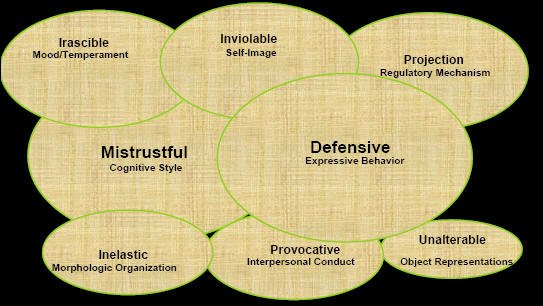
How Being Paranoid Can Be A Sign Of An Underlying Mental Illness

Perhaps your parents used to tell you the words above when you were a kid. Back then, you were still innocent, and your parents only wanted to protect you from the cruelty of the world. They may have taught you to never trust any stranger because they might harm you. While being wary of strangers can be your first line of defense against harm and danger, there is a percentage of people who get too paranoid with the way they deal with things. Even if you already know a person, you couldn’t help but question their decisions, their motives, as well as their intentions of befriending with you. We’re aware that you really shouldn’t give your 100% trust to anyone in case of betrayal, but sometimes your hyperactivity with regards to judging and overanalyzing people can be signs of an underlying mental problem.
For some people, even if they already know a person, they cannot hep but question their decisions and their intentions of befriending you. We are aware that you should not give your 100% trust to anyone in case of betrayal, but sometimes your hyperactivity with regards to judging and overanalyzing people can be signs of an underlying mental problem.
Did you know that being too paranoid is actually a symptom of a mental illness? This is most commonly known as PPD (Paranoid Personality Disorder). Continue reading to know more about this disorder.
 People With Paranoid Personality Are Difficult To Deal With
People With Paranoid Personality Are Difficult To Deal With

Since people with PPD are always suspicious of things, they can be very difficult to befriend and deal with. You will find yourself constantly reassuring the victim that you only have good intentions and that you’re clean and honest.
Meanwhile, patients with PPD are always caught up in their own world of defensiveness. We can easily judge them as rude and hostile, complainers and argumentative. They always throw themselves into chaoses that ultimately lead to broken friendships and relationships. It might be very difficult to deal with such people, but you have to understand that it is only their way of defending themselves.
 Family Influence and Childhood Trauma Can Be Potential Causes of PPD
Family Influence and Childhood Trauma Can Be Potential Causes of PPD
Mental Health Researchers are still carrying various studies to determine the exact cause of PPD. However, they have determined that some family influences and traumatic experiences from the patient’s childhood life may influence the development of PPD. PPD may exist within families that have a background of delusional disorders and schizophrenia. If you think your family has that family background, you might want to check out these symptoms to determine if your children can get this mental disorder:
- Detachment.
- Weak self-image.
- Relentless suspicion.
- Social isolation.
- Paranoia.
- Inability to collaborate.
- Expectation they will be exploited.
- Hypersensitive to criticism.
- Argumentative and defensive.
It may surprise you to learn that PPD occurs in about 0.5%–2.5% of the general population. Men are more likely to suffer from this disorder than women.
 People With Paranoid Personality Disorder Can Be Helped
People With Paranoid Personality Disorder Can Be Helped

Even though this mental disorder is not popular compared to other mental disorders, the great news is that the victims can definitely be helped. Here are our three recommended technique to help you overcome your disorder.
 Learn More About the Disorder
Learn More About the Disorder
If you suspect that you’re harboring the symptoms of PPD, it is important that you take a deep, calming breath. The first thing you need to do is educate yourself about this disorder. If you are equipped with the right knowledge and information, you will be able to understand more about your problem and take the necessary next steps to cure it. You can find helpful online resources and books on AbeBooks or Amazon.
 Seek a Trustworthy and Professional Therapist
Seek a Trustworthy and Professional Therapist
Now that you know about your disorder, you can seek a professional therapist. You need to understand that you cannot do it all alone. As such, you need to seek external help. A licensed and professional therapist can help you tackle these issues in a personal manner and help you overcome your disorder. However, before you book a session, you need to lower down your defenses to be able to trust your therapist instead of being suspicious of him.
 Enlist Family Support
Enlist Family Support
Last but definitely not the least, you need to seek family support. Since you are suspicious of everyone around you, we know for sure that the only circle you can trust with all your heart is your family. Therefore, reach out to them and they will be able to help and support you to overcome your problem.
More in Mental Health
-
`
The Physical Signs of Hunger and How Mindful Eating Makes a Difference
Hunger is one of the most basic yet essential signals our body uses to communicate its need for energy. However, many...
December 15, 2024 -
`
Why Did Chris Pratt Call Anna Faris Before Proposing to Katherine?
Chris Pratt, the beloved star of “Guardians of the Galaxy,” made headlines when he revealed that he called his ex-wife, Anna...
December 3, 2024 -
`
6 Proven Tips to Tackle Insurance Claim Denials Successfully
Claim denials are a common hurdle for healthcare providers and professionals, even for those who follow the necessary procedures to avoid...
December 1, 2024 -
`
5 ‘Bad’ Fitness TikTok Trends You Shouldn’t Follow
TikTok has become a haven for creative fitness advice. But not all trends are worth your time or your health. From...
November 23, 2024 -
`
Does Drinking Water Affect Adrenal Hormones?
Drinking water is often seen as a simple way to stay hydrated, but it has deeper effects on our body than...
November 14, 2024 -
`
Why We Feel the Loss of Celebrities So Deeply?
Celebrity grief might sound strange at first. After all, most of us have never met these famous figures in person, yet...
November 5, 2024 -
`
Are High Deductible Insurance Plans as Ideal as They Appear to Be?
High deductible insurance plans have been a hot topic for years, especially as healthcare costs continue to rise. For many Americans,...
October 31, 2024 -
`
How Training Load Data Can Transform Your Exercise Routine
Tracking progress during workouts is challenging. Simple metrics like mileage or time don’t show the whole picture. Understanding the overall effort...
October 26, 2024 -
`
Katy Perry’s Weight Loss Journey: Secret Diet Tips Revealed
Katy Perry’s weight loss journey has been making headlines, with the pop star shedding 20 pounds over the past few months....
October 16, 2024















You must be logged in to post a comment Login